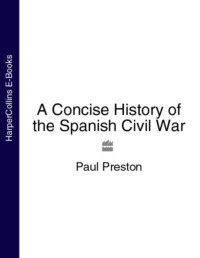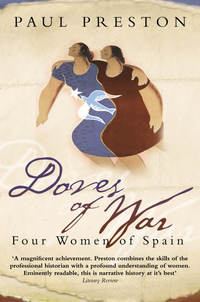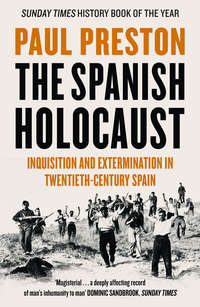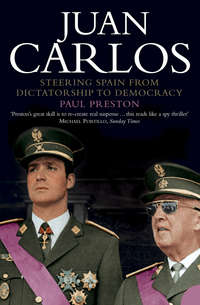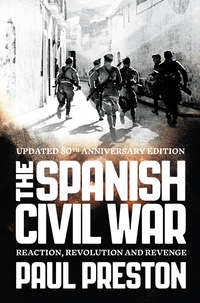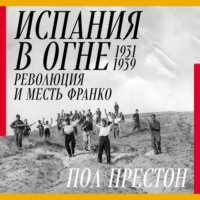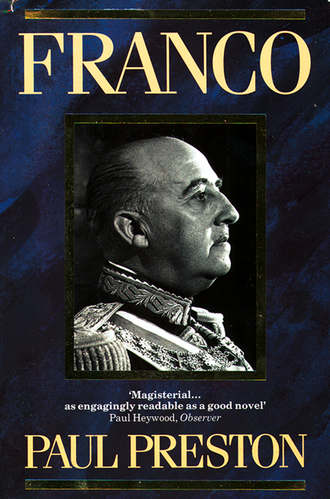
Полная версия
Franco
The social position of both bride and groom was reflected in the fact that those who signed the marriage certificate as witnesses included two local aristocrats, the Marqués de la Rodriga and the Marqués de la Vega de Anzó. The unctuous tone of local reporting not only gives an indication of the prestige that Franco already enjoyed but it also reflects the kind of adulation with which he was bombarded. ‘Yesterday, Oviedo enjoyed moments of intimate and longed-for satisfaction and of jubilant delight. It was the wedding of Franco, the brave and popular head of the Legion. If the desire of the couple to see their love blessed before the altar was great, the interest of the public was no less immense on seeing them happy with their dream of love come true. In this pure love, all of us who know Franco and Carmina have given something of their own hearts and have suffered with them their worries, their anguish, their justified impatience. From the King down to the last of the hero’s admirers there was a unanimous desire that this love, so beset by ill-luck, should have the divine sanction which would lead them to the supreme happiness.’23 ‘The pause in the struggle of the brave Spanish warrior has had its triumphant apotheosis. Those polite and gallant phrases whispered by the noble soldier in the ear of his beautiful beloved have had the divine epilogue of their consecration.’24 One journal in Madrid headed its commentary with the headline ‘The Wedding of an heroic Caudillo’ (warrior-leader).25 This was one of the first ever public uses of the term Caudillo with respect to Franco. It can easily be imagined how such adulatory prose moulded Franco’s perception of his own importance.
By tradition, on marrying, a senior officer was required to ‘kiss the hands’ of the King. After a few days honeymoon spent at the Polo summer house, La Piniella near San Cucao de Llanera outside Oviedo, and prior to setting up home in Ceuta, the newly weds travelled to Madrid and called at the royal palace in late October. In 1963, the Queen recalled lunch with a silent and timid young officer.26
In later years, Franco himself twice recounted the interview with the King to his cousin and also to George Hills. Franco alleged in these accounts that the King was anxious to know how the Army in Africa felt about the recent coup and the military situation in Morocco. Franco claimed to have told the King that the Army was doubtful about Primo because of his belief in the need to abandon the protectorate. When the King demonstrated an equally pessimistic inclination to pull out, Franco boldly replied with his opinion that the ‘rebels’ (the local inhabitants) could be defeated and the Spanish protectorate consolidated. He allegedly pointed out that, so far, Spanish operations had been piecemeal, pushing back the Moors from one small piece of ground after another, attempting to hold it, and to retake it after it had been recaptured. Rather than this endless drain on men and materials, Franco suggested an idea long favoured by Africanistas, a major attack on the headquarters of Abd el Krim in the region of the Beni Urriaquel tribe. The most direct route was by sea to the Bay of Alhucemas.
The King arranged for Franco to dine with General Primo de Rivera and tell him of his plan.27 Primo was hardly likely to be sympathetic given both his long-standing conviction that Spain should withdraw from Morocco and his determination, as Dictator, to reduce military expenditure.28 When he met Franco, Primo would almost certainly not have been surprised to hear that the young Lieutenant-Colonel shared the commitment of the Africanistas to remaining in Morocco. Franco had long since published his variant of the view that Spain’s Moroccan problem would be solved at Alhucemas, ‘the heart of anti-Spanish rebellion, the road to Fez, the short exit to the Mediterranean, and there is to be found the key to much propaganda which will end the day that we set foot on that coast.’29 The idea of a landing at Alhucemas had been in the air for some years and the general staff had prepared detailed contingency plans in the event of the politicians giving the go-ahead. According to his own account, by the time Franco managed to put his case for a landing to the Dictator, it was in the early hours of the morning. The anything but abstemious Primo was somewhat merry, and Franco was convinced that he would never remember their conversation. Nevertheless, Primo suggested that he submit his scheme in written form.
In this subsequent version of events, Franco’s narrative is tailored to show that the plan for the Alhucemas landing was his own. That he should remember it as his own brainchild was entirely understandable after years of being told so by sycophants and given the fact that he did play a prominent role in putting the case against withdrawal from Morocco.30 At the beginning of 1924, he had been one of the founders, along with General Gonzalo Queipo de Llano, of a journal called Revista de Tropas Coloniales which advocated that Spain maintain its colonial presence in Africa. At the start of 1925, he would become head of its editorial board. Franco was to write more than forty articles for the journal. In one published in April 1924, entitled ‘passivity and inaction’, he argued that the weakness of Spanish policy, ‘the parody of a protectorate’, was encouraging rebellion among the indigenous tribes.31 It made a considerable impact.
Shortly after visiting the King, the newly wed Franco and his bride took up residence in Ceuta. The situation in Morocco seemed ominously quiet. In fact, by the spring of 1924, Abd el Krim’s power had grown enormously and he no longer recognized the authority of the Sultan. He was presenting himself as the figurehead of a vaguely nationalistic Berber movement and talking in terms of establishing an independent socialist state. Numerous tribes accepted his leadership and, under his self-bestowed title of ‘Emir of the Rif’, in 1924, he formally requested membership of the League of Nations.32 After the defeat of Annual, the Spanish counter-offensive had recaptured an area around Melilla. Apart from that, the Spanish foothold consisted only of the towns of Ceuta, Tetuán, Larache and Xauen. The local garrisons were confident that they could hold the territory but were seriously disturbed by rumours that they were about to receive orders to withdraw. Anticipating difficulties, the military commander of Ceuta, General Montero, during the fesival of the Pascua Militar on 5 January called upon the officers under his command to give their word that they would obey orders no matter what they were. Franco took the lead in pointing out that they could not be asked to obey orders that were contrary to military regulations.33
Possibly alerted by these objections, Primo de Rivera finally decided to inspect the situation personally. In the meantime, Sanjurjo was sent to take over as commander of Melilla. Abd el Krim greeted him with an offensive on Sidi Mesaud only to be driven back by the Legion commanded by Franco. When the Dictator arrived in June 1924, he quickly grasped the essential absurdity of the Spanish military predicament. His inclination was to abandon the Protectorate on the grounds that to pacify it fully would be too expensive and to go on holding it on the basis of strings of waterless, indefensible blockhouses was ludicrous. For part of his tour, the Dictator insisted on being accompanied by Franco. At the time, the young Lieutenant-Colonel was deeply concerned about rumours that Primo had come to arrange a Spanish withdrawal. He had just tried to convince the High Commissioner, General Aizpuru, that the publication of orders to abandon the inland towns would provoke a major offensive by the forces of Abd el Krim. Franco had agreed with Lieutenant-Colonel Luis Pareja of the Regulares that, in the event of a withdrawal from Xauen, they would both apply for transfers to the mainland. In a letter to Pareja in July 1924, Franco declared that when the time came the bulk of his officers would do the same.34
At one notorious dinner, in Ben Tieb on 19 July 1924, there was an incident involving the Legion and the Dictator which has become the basis of subsequent myth. This was the dinner at which, legend in the Legion would have it, Franco had arranged for the Dictator to be served a menu consisting entirely of eggs.35 Huevos (eggs) being the Spanish slang for testicles, the machista symbolism was obvious: the visitor needed huevos and the Legion had plenty to spare. However, given Franco’s fanatical respect for discipline and his ambitious concern for his career, it is difficult to believe that he would so blatantly insult a senior officer and head of the government. In 1972, Franco denied that such a menu had been served.
At the dinner, Franco made a harsh but careful speech against abandonismo. What he said revealed his lifelong commitment to Spanish Morocco: ‘where we tread is Spanish soil, because it has been bought at the highest price and with the most precious coin: the Spanish blood shed here. We reject the idea of pulling back because we are convinced that Spain is in a position to dominate her zone.’ Primo responded with an equally strong speech explaining the logic behind plans for a withdrawal and a call for blind obedience. When a Colonel of Primo’s staff said ‘muy bien’ (hear, hear), the irascible and diminutive Major José Enrique Varela, unable to contain himself, shouted ‘muy mal’. Primo’s speech was interrupted by hissing and hostile remarks. Sanjurjo, who accompanied him, later told José Calvo Sotelo, the Dictator’s Minister of Finance, that he had kept his hand on the butt of his pistol throughout the speeches, fearing a tragic incident. When the Dictator finished he was greeted with total silence. Franco, ever careful, hastened to visit Primo immediately after the dinner to clarify his position. He said that if what had happened required punishment, he was prepared to resign. Primo made light of Franco’s part in the affair and permitted him to return later and again put his point of view about a landing in Alhucemas.36 In his own 1972 version, he claimed, implausibly, to have given Primo de Rivera a dressing down. As a consequence, he said, Primo de Rivera promised to do nothing without consulting the ‘key officers’.37
Shortly after the Ben Tieb dinner, the Dictator prepared an operation to fold up 400 positions and block-houses. As Franco and others had warned, the talk of withdrawal encouraged Abd el Krim and stimulated the desertion of large numbers of Moroccan troops from the Spanish ranks. Lieutenant-Colonel Pareja understood that this meant that the conditions agreed with Franco for their joint resignations had arrived. He presented his transfer request and was disgusted to discover that Franco had not kept his word. Franco, always cautious, particularly after his confrontation with Primo de Rivera, remained in his post.38 Shortly after the return of Primo to Madrid, Abd el Krim attacked in force, cutting the Tangier-Tetuan road and threatening Tetuan. A communiqué was issued on 10 September 1924 announcing the evacuation of the zone. Anxiety about the consequences of the proposed withdrawal led a number of officers in Africa to toy with the idea of a coup against Primo. The ring-leader was Queipo de Llano, who claimed in 1930 that Franco had visited him on 21 September 1924 to ask him to lead a coup against the Dictator. In 1972, Franco did not deny that the conversation had taken place. However, as had happened in the case of his pact with Lieutenant-Colonel Pareja, nothing came of an uncharacteristically frank expression of discontent. Where military discipline was concerned, habitual caution always prevailed.39
Franco and the Legion were thrown into service at the head of a column led by General Castro Girona which set off from Tetuan on 23 September in order to relieve the besieged garrison at Xauen, ‘the sacred city’, in the mountains. It took them until 2 October to fight the forty miles there. Over the next month, units from isolated positions drifted in until at the beginning of November there were ten thousand men in Xauen, many of them wounded, most of them exhausted. An evacuation was then undertaken. Primo won over much of the Army of Africa by assuming complete responsibility for whatever might happen, naming himself High Commissioner on 16 October. He returned to Morocco and set up his general staff in Tetuán. The evacuation of the Spanish, Jewish and friendly Arab inhabitants of Xauen was an awesome task. Children, women, and other civilians, the old and the sick, were packed into trucks. The immensely long and vulnerable column set off on 15 November. Moving slowly at night, their rear was covered by the Legion under Franco. Constantly harrassed by raiding tribesmen, and severely slowed down by rain storms which turned the tracks into impassable mud, it took four weeks to return to Tetuan where the survivors arrived on 13 December. It was a remarkable feat of dogged determination though nothing approaching the ‘magisterial military lesson’ perceived by Franco’s hagiographers.40
Franco was deeply disappointed to be a party to the abandonment of any fragment of the territory in defence of which much of his life had been spent. He published an article on the tragedy of the withdrawal, based on his diary. Vividly and passionately written, it reflects the resignation and sadness of the day before the retreat.41 However, he was consoled by being awarded another Military Medal and by being promoted to full colonel on 7 February 1925 with effect from twelve months earlier, 31 January 1924. He was also allowed to keep the command of the Legion, although that post should have been held by a Lieutenant-Colonel. He was further consoled when Primo de Rivera in late 1924 changed his mind about abandoning Morocco. The Dictator decided sometime in late November or early December to pursue the Alhucemas landing and ordered that detailed plans be drawn up. In early 1925, Franco experimented with amphibious landing craft. It was during one of these exercises, on 30 March 1925, on board the Spanish coastal patrol vessel Arcila, that he was offered a plate of breakfast by a young naval lieutenant called Luis Carrero Blanco who would, from 1942 to 1973, be his closest collaborator. Franco refused the offer on the grounds that, since being wounded in El Biutz, he always went into action on an empty stomach.42
In March 1925, on a visit to Morocco, General Primo de Rivera presented Franco with a letter from the King and a gold religious medal. The letter was fulsome: ‘Dear Franco, On visiting the [Virgin of the] Pilar in Zaragoza and hearing a prayer for the dead before the tomb of the leader of the Tercio, Rafael Valenzuela, gloriously killed at the head of his banderas, my prayers and my thoughts were for you all. The beautiful history that you are writing with your lives and your blood is a constant example of what can be done by men who reckon everything in terms of the fulfilment of their duty … you know how much you are loved and appreciated by your most affectionate friend who embraces you – Alfonso XIII.’43
After entering Xauen, the triumphant Abd el Krim had celebrated his hegemony by capturing El Raisuni. He then made a colossal mistake. At precisely the moment that the French were moving into the noman’s-land between the two protectorates, his long-term ambition of creating a more or less socialist republic led him to try to overthrow the Sultan, who was the instrument of French colonial rule. Taking on the French, initially he defeated them. His advance skirmishers came within twenty miles of Fez. This led to an agreement in June 1925 between Primo de Rivera and the French commander in Africa, Philippe Pétain, for a combined operation. The plan was for a substantial French force of one hundred and sixty thousand colonial troops to attack from the south while seventy-five thousand Spanish soldiers moved down from the north. The Spanish contingent was to land at Alhucemas under the overall command of General Sanjurjo. Franco was in command of the first party of troops to go ashore and had responsibility for establishing a bridgehead.
There was no effort at secrecy either in the planning or on the night of 7 September, when Spanish ships arrived in the bay with lights ablaze and the troops singing. As a result of poor reconnaissance, the landing took place on a beach where the landing craft hit shoals and sand-banks too far out for tanks to be disembarked. Moreover, the water was at a depth of over one and a half metres and many of the Legionaires could not swim. Their attack was awaited by rows of entrenched Moors who immediately began to fire. The naval officer in charge of the landing craft radioed the fleet where the High Command awaited news. In view of his signal, the vessels were ordered to withdraw. Franco decided that a retreat at that point would shatter the morale of his men and boost that of the Moorish defenders. Accordingly, he countermanded the order and told his bugler to sound the attack. His Legionaires jumped overboard, waded to the shore and succeeded in establishing the bridgehead. Franco was later called before his superiors to explain himself which he did by reference to military regulations which granted officers a degree of initiative under fire.44
The entire operation was a condemnation of the appalling organization of the Spanish Army and poor planning by Sanjurjo. After the bridgehead was established there was insufficient food and ammunition to permit an advance. There was extremely poor ship-to-shore communication and very limited artillery support. Two weeks passed before the order was given to move beyond the bridgehead. Then the advance was subject to the mortar batteries placed by Abd el Krim. In part because of the tenacity of Franco himself, the Spanish attack continued. However, with the French moving up from the south, it was only a matter of time before Abd el Krim surrendered. On 26 May 1926, he gave himself up to the French authorities.45 The resistance of the Rif and Jibala tribes collapsed.
Franco produced a vividly, if somewhat romantically, written diary of his participation in the landing, entitled Diario de Albucemas. It was published over four months from September to December 1925 in the Revista de Tropas Coloniales and again in 1970 in a version which he himself censored.46 Referring to an attack on a hill which took place in the first hours after the landing, he wrote in 1925 ‘those defenders who are too tenacious are put to the knife’ changing it in 1970 to ‘those defenders who are too tenacious fell beneath our fire’. Even after editing the text in 1970, Franco left in phrases reminiscent of the adventure stories of his youth. Men were not shot but ‘scythed down by enemy lead’. ‘Fate has snatched away from us the flower of our officers. Our time has come. Tomorrow we will avenge them!’47 Years later, he told his doctor that, during the Alhucemas campaign, a deserter from the Legion was brought in and, with no hesitation other than the time taken to confirm his identity, he ordered a firing squad to be formed and the man shot.48
On 3 February 1926, Franco was promoted to Brigadier General, which made the front page of the newspapers in Galicia.49 At the age of 33, he was the youngest general in Europe, and was finally obliged by his seniority to leave the Legion. On being promoted, Franco’s service record had the following added: ‘He is a positive national asset and surely the country and the Army will derive great benefit from making use of his remarkable aptitudes in higher positions’.50 He was given command of the most important brigade in the Army, the First Brigade of the First Division in Madrid, composed of two aristocratic regiments, the Regimiento del Rey and the Regimiento de León*.
On returning to Spain, Franco brought with him a political baggage acquired in Africa which he would carry through the rest of his life. In Morocco, Franco had come to associate government and administration with the endless intimidation of the ruled. There was an element too of the patronizing superiority which underlay much colonial government, the idea that the colonised were like children who needed a firm paternal hand. He would effortlessly transfer his colonial attitudes to domestic politics. Since the Spanish Left was pacifist and hostile to the great adventure in Morocco, associated in his mind with social disorder and regional separatism, he considered leftists to be as dire an enemy as rebellious tribesmen.51 He regarded the poisonous ideas of the Left as acts of mutiny to be eradicated by iron discipline which, when it came to governing an entire population, meant repression and terror. The paternal element would later be central to his own perception of his rule over Spain as a strong and benevolent father figure.
In Africa, Franco had also learned many of the strategems and devices which were to be his political hallmark after 1936. He had observed that political success came from a cunning game of divide and rule among the tribal chiefs. That is what the Sultan did; it was what the better Spanish High Commissioners aspired to do. At a lower level, local garrison commanders had to do something similar. Astute, greedy, envious and resentful chieftains were played off against one another in a shifting game of alliances, betrayals and lightning strikes. His assimilation of such skills would permit him to run rings around his political enemies, rivals and collaborators inside Spain from 1936 until well into the 1960s. Although he acquired such skills, he had never developed any serious interest in the Moroccans. Like most colonial officers, Franco did not learn more than a smattering of the language of those he fought and ruled. Later in life, he would also fail in his attempts to learn English. Absorbed in military matters, he could never muster much interest in other cultures and languages.52
On the day on which his promotion to general was announced, Franco’s success had been somewhat overshadowed by the spectacular national newspaper coverage given to his brother Ramón. Major Ramón Franco was crossing the South Atlantic with Captain Julio Ruiz de Alda, one of the future founders of the Falange, in the Plus Ultra, a Dornier DoJ Wal flying boat.53 The regime and the press was treating Ramón as a modern Christopher Columbus. A committee was set up in El Ferrol to organize various tributes to the two brothers, including the unveiling of a plaque on the wall of the house in which they had been born. It read ‘In this house were born the brothers Francisco and Ramón Franco Baamonde, valiant soldiers who, at the head of the Tercio of Africa and crossing the Atlantic in the seaplane ‘Plus Ultra’, carried out heroic deeds which constitute glorious pages of the nation’s history. The town of El Ferrol is honoured by such brilliant sons to whom it dedicates this tribute of admiration and affection.’54
Franco took up his important post in Madrid in time to admire the achievements of the Primo de Rivera dictatorship. What the officer corps perceived as regional separatism had been suppressed and labour unrest dramatically diminished. Anarchist and Communist unions had been suppressed while the Socialist union, the Unión General de Trabajadores, was given control of a newly created state arbitration machinery. The UGT became the semi-official trade union organization of the regime. A massive programme of infrastructural investment in roads and railways created a high degree of prosperity and near full employment. For an Army officer, particularly after the disorders of the period 1917 to 1923, it was a good time to be on active service. The constant criticism of the Army which officers associated with the parliamentary monarchy had been silenced. The triumph of Alhucemas had revived military popularity. It is little wonder that, like many Army officers and civilian rightists, Franco would come to look back on the six years of the Primo de Rivera dictatorship as a golden age. He often commented during the 1930s that they were the only period of good government that Spain had enjoyed in modern times. In his view, Primo’s error was to have announced that he would hold power only for a short time until he had solved Spain’s problems. Franco said reprovingly to his Oviedo acquaintance, the monarchist, Pedro Sainz Rodríguez ‘that was a mistake; if you accept a command you have to take it as if it was going to be for the rest of your life’.55


